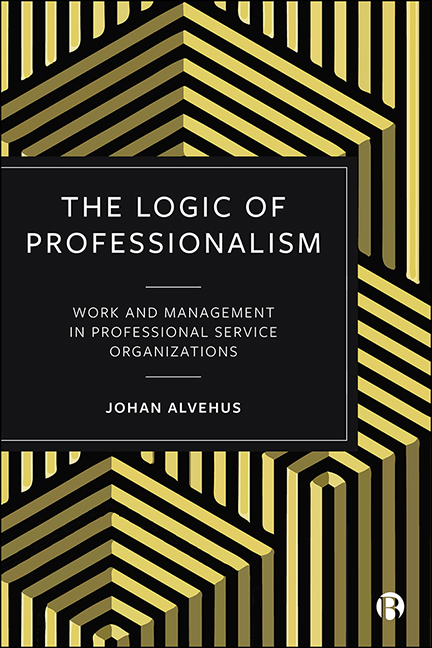Book contents
- Frontmatter
- Dedication
- Epigraph
- Contents
- About the Author
- Preface
- 1 Work in Professional Service Organizations
- 2 Professionalism from an Institutional Logics View
- 3 The Ambiguity of Professional Service Work
- 4 Control, and Control over Control
- 5 The Politics of Leadership
- 6 Superficial Hybridity
- 7 Understanding the Logic of Professionalism
- 8 The Future of Professional Work
- References
- Index
1 - Work in Professional Service Organizations
Published online by Cambridge University Press: 30 April 2022
- Frontmatter
- Dedication
- Epigraph
- Contents
- About the Author
- Preface
- 1 Work in Professional Service Organizations
- 2 Professionalism from an Institutional Logics View
- 3 The Ambiguity of Professional Service Work
- 4 Control, and Control over Control
- 5 The Politics of Leadership
- 6 Superficial Hybridity
- 7 Understanding the Logic of Professionalism
- 8 The Future of Professional Work
- References
- Index
Summary
Lawyers. Physicians. Accountants. Finance analysts. Psychologists. Researchers. Management consultants. They are all examples of the goldcollar proletarians of our age – they are doing professional work. But what do these professionals actually do? And how is their everyday work organized?
Professional work is said to be the quintessential work of the knowledge society, involving high education demands, complex and challenging tasks, and a working life characterized by continuous learning and personal development. At the same time, we find claims that this professional ideal is crumbling. Increasingly professionals work in large bureaucracies and seem to have work conditions not very different from non-professionals. New forms of management are said to erode their independence, autonomy, and status. And frequently we see reports of overwork, fatigue, and burnout, also among elite workers. Despite all the presumed independence of professional workers, they are said to need leadership in order to be able to provide their services in a good way. And on top of this come high-profile scandals in finance, health care, auditing, and so on, undermining their status and legitimacy: How can professionals perform so badly when they’re supposed to be so good, so professional?
In this book I will try to address questions such as these by exploring the practices that maintain and uphold what is often called the logic of professionalism (Freidson, 2001). But these questions are far from simple, and neither will the answers be. If you read the previous paragraph carefully, you will see that it is full of contradictory statements. We associate professional work with independence; yet professionals often work in large bureaucracies. We associate professional work with autonomy; yet professionals are increasingly subject to control. We associate professional work with individual competence and judgement; yet professionals supposedly need leadership. Such tensions will come back throughout this book.
This is also to say that professional service work and professional service organizations operate in an environment with often conflicting expectations from professionals themselves, from clients, from formally appointed non-professional managers, and from stakeholders such as governmental bodies and interest organizations.
- Type
- Chapter
- Information
- The Logic of ProfessionalismWork and Management in Professional Service Organizations, pp. 1 - 11Publisher: Bristol University PressPrint publication year: 2021



